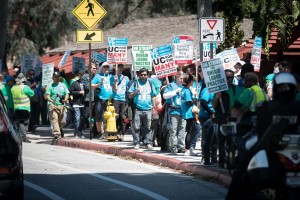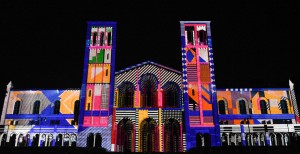Another year at UCLA has gone by, and in between hustling to keep our grades afloat and maintaining energetic social lives, a variety of campus happenings have caught the eye of the media.
From a public health disaster to involvement in a scandalous college admissions scheme, UCLA is no stranger to national news headlines. Looking ahead to UCLA’s next 100 years, it will be difficult to forget these consequential events that put the action into the 2018-2019 school year.
Measles outbreak
Public health officials identified UCLA as a possible site for measles exposure April 22, after an infected student attended classes in Franz Hall and Boelter Hall earlier that month.
More than 500 people at UCLA were identified as potentially exposed to the virus. Of those, 119 students and eight faculty members were put in quarantine, and were released only after providing proof of immunization. As the week went on, the number of people in quarantine dwindled until there was only one on-campus student left and 27 left isolating themselves off-campus.
Students who were quarantined said the conditions were not just comfortable – they were fun. But there’s nothing comfortable, nor fun, about such a close encounter with measles on the smallest UC campus with the largest student body. UCLA was fortunate to have gotten away relatively unscathed – but without tightening vaccination requirements, our epidemiological future could be disastrous.
College admissions scandal
News broke out mid-March revealing UCLA’s involvement in one of the nation’s largest racketeering college admissions scandals. Men’s soccer coach Jorge Salcedo was revealed as a pawn in the bribery scheme that shook the world of higher education.
Salcedo received the transcript, test scores and falsified soccer profile of the daughter of Bruce and Davina Isackson from a former USC soccer coach. He forwarded the information to a UCLA women’s soccer coach and the student was admitted to UCLA as a student-athlete. Salcedo also received a $100,000 check in exchange for designating another student as a recruit for men’s soccer, despite the student never having played competitively.
The signature at the bottom of Salcedo’s hefty check was that of William Singer, the founder of the college preparation companies Edge College & Career Network and the Key Worldwide Foundation. Parents paid Singer a total of $25 million from 2011 through February 2019 to have their children’s standardized tests taken for them.
Coaches from USC, Stanford and Yale were also allegedly involved. The thing UCLA has in common with these three universities? They are all among the most highly-ranked institutions in the nation. For students, that’s a cause for concern.
In fact, two Stanford students filed a lawsuit against several of the universities involved, including UCLA, claiming that future employers might question the legitimacy of their degrees, coming from a university known to have had fraudulent admissions practices.
AFSCME strikes
In the past year alone, two workers unions – the American Federation of State, County and Municipal Employees Local 3299 and University Professional and Technical Employees-Communications Workers of America 9119 – took to the picket lines five times to protest the UC’s unfair labor practices.
The first three strikes, in May 2018, October 2018 and March 2019, were in response to unfair wages, outsourcing, increased retirement age and health care premiums. The UC, however, claimed at the time that it offers AFSCME Local 3299 employees health care benefits at the same rate as other employees.
The fourth strike came April 10 after AFSCME Local 3299 filed an Unfair Labor Practice charge against the University for allegedly mistreating and intimidating workers at the picket lines during previous strikes.

Finally, on May 16, AFSCME held a systemwide strike at all 10 UC campuses in response to the UC’s alleged illegal outsourcing of labor.
Not only do the strikes cause quite a ruckus on campus, they leave students living on the Hill with limited dining options. While this seems like a small price to pay for the livelihood of the very people who make this university run, the ubiquity of these strikes is undoubtedly a disruption to students’ education.
Sexual assault lawsuit
On August 10, before the school year even began, a UCLA student filed a sexual assault lawsuit against two UCLA fraternities – Zeta Beta Tau and Sigma Alpha Epsilon.
These two fraternities, as well as the Interfraternity Council and ZBT member Blake Lobato, faced charges of negligence, assault, battery and intentional infliction of emotional distress.
According to court documents, the student attended a party at SAE and was then encouraged by Lobato to spend the night at ZBT since she was heavily intoxicated. After the student agreed, Lobato sexually assaulted her. Little was done by the then-ZBT president when the incident was reported to him. Only after the student filed through the Title IX office was Lobato expelled.
At the start of the school year, student government officials called on fraternities to hold themselves accountable for the predatory behavior that is so common in their culture. The council recommended that fraternity members undergo consent and intervention training as well as partake in a town hall to discuss issues surrounding sexual assault.
UCLA turns 100
This year marks UCLA’s 100th birthday.
100 years ago, our now-sprawling campus consisted of nothing but Royce Hall, Haines Hall, Powell Library and Kaplan Hall. This year, the quad in front of these buildings served as a primary location for the start of many centennial celebrations.

In celebration of UCLA Alumni Day on May 18, students and alumni gathered for performances in Fowler Museum, a TEDxUCLA event, lectures by faculty and alumni and a talk between Chancellor Gene Block and previous UCLA chancellors. The day concluded with a light show projected on the exterior of Royce Hall. Alumni Day was just the beginning of UCLA’s 14-month series of events and initiatives.
In honor of its centennial anniversary, UCLA also launched its “Let There Be” campaign to raise money for the university’s endowment and scholarships, as well as four other initiatives which aim to showcase UCLA’s archives and contributions to social justice in Los Angeles.
UCLA’s 100 years have come to show that it is no longer just UC Berkeley’s younger sibling. It is the nation’s No. 1 public university, with a presence that can be felt not just around the sprawling metropolis of Los Angeles, but across the world.
